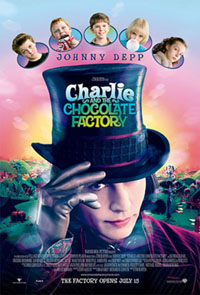 CHARLIE AND THE CHOCOLATE FACTORY
CHARLIE AND THE CHOCOLATE FACTORY(PG)
**** (out of 5)
July 15, 2005
STARRING
Johnny Depp as WILLY WONKA
Freddie Highmore as CHARLIE BUCKET
David Kelly as GRANDPA JOE
Helena Bonham Carter as MRS. BUCKET
Noah Taylor as MR. BUCKET
Missi Pyle as MRS. BEAUREGARDE
Studio: Warner Bros.
Directed by: Tim Burton
BY KEVIN CARR
Listen to Kevin’s radio review…
My biggest worry about “Charlie and the Chocolate Factory” was not that Johnny Depp wasn’t going to live up to Gene Wilder’s performance. It wasn’t that Tim Burton was going to ruin the book. It wasn’t that we were going to get a sub-standard remake like “Planet of the Apes.”
My biggest worry was the Oompa-Loompas.
You see, like most people in their mid-30s, I was terrified of the Oompa-Loompas as a kid. I suppose they were meant to be cute, but they were horrifying little creatures. And while they were the stuff of nightmares, they were also the most vivid memory I have of watching “Willy Wonka and the Chocolate Factory” when I was a kid.
In watching the trailers for Tim Burton’s “Charlie and the Chocolate Factory,” I was disappointed in the Oompa-Loompas. They weren’t scary at all. They were, in fact, rather silly. However, when I finally saw the film, I warmed up to them.
The Oompa-Loompas are a microcosm of Tim Burton’s genius, and they are indicative of why “Charlie and the Chocolate Factory” is a success rather than a weak rip-off.
Tim Burton did not set out to remake this movie. Word is that he hated the original “Willy Wonka and the Chocolate Factory.” Instead, he set out to adapt Roald Dahl’s original book. And no matter how many times you hear someone in the media (including myself) say that the Gene Wilder version is “the original,” it isn’t. The book is the true original.
I read the book so long ago that I don’t really remember it, but what I do remember seems to click with this film. Of course, it’s a highly stylized film, but that’s what you get with Tim Burton. And while Burton’s got reputation for being exceedingly dark in his features, this movie isn’t all that creepy. It’s actually the closest Burton’s ever come to making a kid’s film. Go back and watch the Gene Wilder version, and you’ll see a much darker, disturbing film.
Johnny Depp is phenomenal as the reclusive Willy Wonka. His dark, creepy, yet lovable portrayal of the candy genius is what propels the film beyond the expected eye-popping production design and special effects. Too often people mistake Willy Wonka to be a lover of children. He isn’t. Instead, he’s a child himself. He thinks like a child, acts like a child and runs his chocolate factory like a child.
If you pay attention, you’ll realize that Willy Wonka actually hates children – almost as much as he hates parents. He’s like Dr. Suess, who was a master storyteller of children’s fiction but wasn’t particularly fond of them in person.
The unfortunate thing for Depp is that his tremendously well-crafted performance comes off as silly in the movie’s trailers. His Willy Wonka isn’t something to be ingested in small bites. You need to watch the whole thing to fully appreciate his work.
Freddie Highmore, who plays Charlie, is great. He easily held his own against Depp and brought a level of warmth to the movie. Normally, casting a lead child is tough. Annoying kids are easy. Heck, there’s three versions of “The Bad News Bears” this year, each with a rogue’s gallery of nutty children. But an average child that can connect with adults as well as children is a rare find indeed. After first getting noticed in “Finding Neverland,” and now “Charlie and the Chocolate Factory,” Highmore is the new kid to watch in Hollywood.
One big diversion from the Gene Wilder film is that this movie is not a musical. There’s no songs by Charlie, Willy Wonka or anyone else for that matter. Only the Oompa-Loompas sing. But they don’t sing the familiar “oompa loompa doopedy doo” song. They have little production numbers with songs based on Dahl’s original lyrics. These scenes seem a little silly and out-of-place, but they work to a degree and are at least true to the book.
Finally, Burton gives us a much better ending than we ever saw in the Gene Wilder film. We actually get some resolution, and while this is where the script took more artistic license, it was far more satisfying than just watching a great glass elevator disappear over the skies of London.
Podcast: Play in new window | Download
